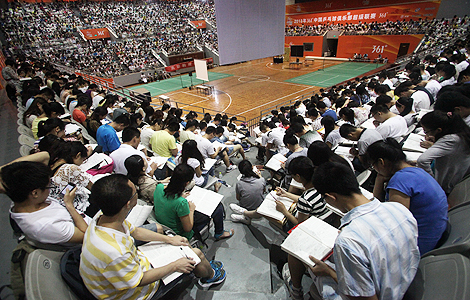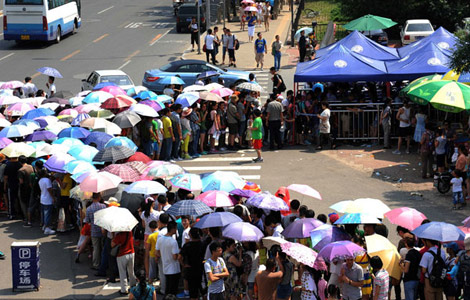

Shopping trends
The shift toward the Web has been huge, according to ACNielson, a global market research company headquartered in New York, which reported that 56 percent of China's 400 million-plus netizens are browsing for books.
Last year, online stores accounted for 10 percent of all book sales, show figures from the publishers' association.
"Online bookstores are one of the major factors behind our defeat," said Wang Xiaomei, manager of Sanlian Bookstore in Guangzhou.
Not only do Internet businesses offer a greater selection of products and convenient delivery services but they also benefit from being able to undercut traditional stores with hefty discounts.
With fewer overheads, Web-based stores can still make a profit from selling books up to 50 percent cheaper than walk-in shops.
"Many books, even the newly published ones, are sold at lower prices online," said Shang Shuling, an editor with Nan Fang Press Group in Guangzhou and a self-confessed bookworm.
"Sometimes, when I was interested in a certain book, I wander around the bookstores (to look at it) and then go home and buy it online," said the 40-year-old, who has a collection of more than 6,000 books, most of which he bought years ago from Sanlian.
The pricing strategy used by Web stores, which knock an average of 30 percent off the cover price, has helped reduce the profit made by traditional bookshops by at least 5 percent, according to media reports.
Liu Suli, who owns the popular Wansheng Bookstore in Beijing, said he and another shop owner last year spent days locked in negotiations over pricing with executives from Amazon and Dangdang, two of China's major online book outlets. The parties were unable to reach a deal.
"The costs for running a real bookstore are far more than one online," said Liu, who like others across China has seen rental charges at least triple since the early 2000s. "We just can't compete with them on price."
In March this year, three publishing associations issued the price-fixing management order, which banned traders from selling books at lower than 85 percent of the cover price within the first year of publication.
The order was rescinded just six months later as it violated the anti-monopoly regulations under Chinese law.
"The order was useless even when it was introduced," said the owner of a small independent bookstore in Guangzhou who did not want to be identified. "There were no punishments and no enforcement."
The introduction of e-books has also impacted the market, with more than 7 million e-readers sold on the Chinese mainland last year, said officials with the State Council's Information Office.
Ou Weijie, a senior consultant with the China National Publications Import and Export Corporation, said he believes devices like Amazon's Kindle and Samsung's Papyrus are just passing fads.
"E-books don't offer the real feeling of reading," argued the 50-year-old. "Generations born in the 1980s and 1990s may like this technology but when they get older, say 40 or so, they will return to paper books."







